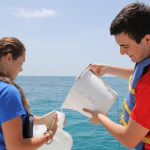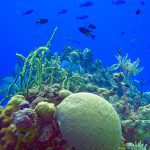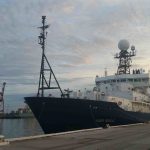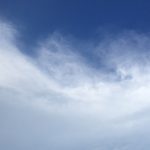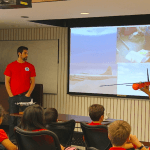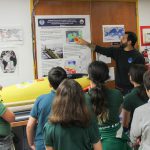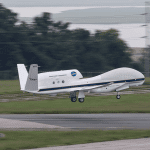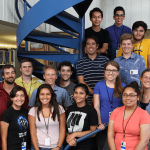This summer, AOML will be diving into a new outreach initiative with the Central Caribbean Marine Institute, a coral reef research organization based in the Cayman Islands. From June through August, NOAA oceanographers from AOML will give a series of talks on various oceanographic topics to the institute’s staff and students participating in the National Science Foundation’s (NSF) Research Experiences for Undergraduates program at the institute’s Little Cayman Research Centre (LCRC).
Central Caribbean Marine Institute is a non-profit organization whose mission is to conduct and facilitate research, education, outreach and conservation programs that will sustain marine diversity. They support key research into addressing global issues such as climate change, marine protection, fisheries management and coral reef impacts. Every summer, the institute hosts undergraduate students at the LCRC as part of the NSF funded research program. Students work with mentors to design, implement, and present research projects within the institute’s research themes of coral reef stress, climate change, ocean acidification, and coral reef resilience and restoration.
This lecture series provides students with an opportunity to gain insight into current coral reef research programs in order to help them refine their summer projects. The series also offers networking opportunities for students and staff and fosters relationships with the AOML research community. Topics will range from ocean-reef interactions, microbiology, ecosystem-based management, and impacts to coral health. Funding for the lecture series is being provided by CCMI.
“I always get bored with minute-detail subjects like molecular studies, but Dr. Chris Kelble’s lecture on the science to inform ecosystem-based management was all about the bigger picture. It’s a topic that I would love to get into,” said Brian Griffiths, an REU student from the University of Delaware. “Dr. Kelble was the first scientist I’ve encountered so far that thinks like I do. He was a great role model to have met!”
In addition to providing lectures, NOAA oceanographers will be teaming up with CCMI scientists and the National Centers for Environmental Information to examine variations of temperature and light at the local scale over the coral reefs surrounding Little Cayman Island. Collecting and analyzing this important data will enhance NOAA’s coral reef ecological forecasting tools and help evaluate the adequacy of regional-scale observations in monitoring for environmental threats to the reefs. This data will also assist other research projects being carried out by various research groups on the Little Cayman reefs including projects focused on constructing a global climate record using coral core samples, connecting water conditions to algal growth on the reefs, and investigating why some reefs are more resilient than others over small distances.
Located on Little Cayman Island, the LCRC is situated next to some of the most biologically diverse reef systems on earth. These reefs are particularly important to coral reef scientists as they are largely unaffected by local human and development impacts. This isn’t the first time NOAA oceanographers will collaborate with the Little Cayman-based research center. NOAA’s Coral Reef Early Warning System (CREWS) established a monitoring station on the reef adjacent to the research center in 2009. CREWS stations are scattered across the Caribbean and contain a suite of oceanographic and atmospheric sensors that monitor environmental conditions in an effort to provide scientists with early warning of climate-related events such as coral bleaching.
See below for a complete schedule of the lecture series:
June 23 – 29
– “Synergistic Effects of Eutrophication and Elevated SST in the Early Life Stages of Two Caribbean Corals”
July 30 – August 3
– “Molecular Microbiology in the Marine Environment: Biocomplexity, Microbial Source Tracking, and Metagenomic Observations”
– “Interactions Between Ocean Health and Human Health”
– “Coral Research at NOAA/AOML’s Ocean Chemistry and Ecosystems Division”
– “Supporting NOAA Coral Reef Research: the Cooperative Institute for Marine and Atmospheric Studies”
August 3 – August 7
– “Spatial Gradients in Carbonate Chemistry and Their Influence on Ecosystem Processes”
– “Science to Inform Ecosystem-Based Management”
– “Sloshing and Mixing Between Reef and Ocean: Physical Processes Impacting Connectivity and Thermal and Biogeochemical Variability for Cayman Corals”
